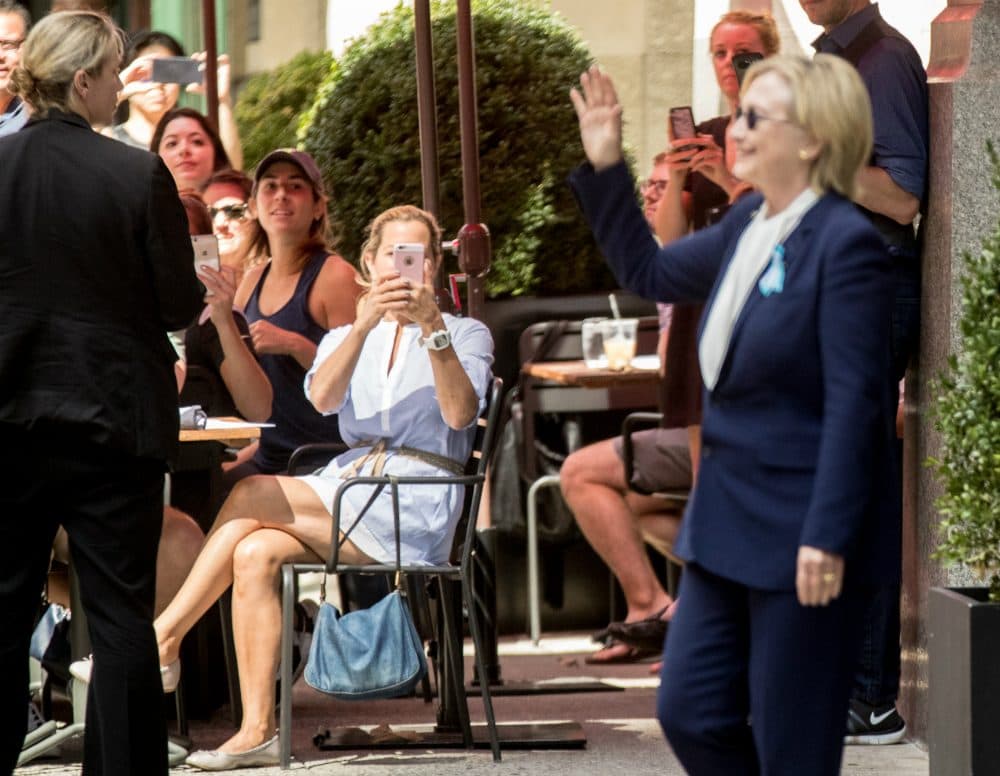Advertisement
Hillary Clinton's Desire For Privacy Is Understandable — And Unacceptable

I’m trying to imagine myself with pneumonia and wondering whether I’d hide it. Being blissfully un-famous and not running for office, I’m pretty sure I’d choose the sympathy and comfort elicited by telling friends. Such is the freedom available to those of us who have chosen to lead mostly private lives.
Hillary Clinton, on the other hand, is far too famous to have my freedom of choice. Someone sent me video of her coughing fits a week ago. Allergy? Bronchitis? I thought maybe just irritated vocal cords from all that campaigning. Yet the longer she was silent about the cough, the more the Internet buzzed with over-the-top diagnostic fantasies.
I have sympathy with her wish for privacy, even as I see it as working against her. Leaving aside the campaign for a moment, society makes a tacit deal with celebrities: We will make you famous — and richer than Croesus — but in return you have to serve as proxy for our desire for intimate stories. Many of us urbanites now live without much communal intimacy, even though possessing some is essential to our feeling a sense of belonging and well-being. One way we now meet the need is through “virtual” intimacy with the famous. It’s perverse, but also weirdly functional.
...when you’re running for president, the public has a right to know some basics about your health.
Of course, when you’re running for president, the public has a right to know some basics about your health. Both Hillary Clinton and Donald Trump have been cagey on this score. And they’re hardly the first.
In 1893, for example, President Grover Cleveland was diagnosed with a malignant tumor in his mouth. Tired of being a target of his era’s sensational press, he secretly gathered a group of surgeons, and snuck them and himself aboard a yacht. As it puttered along the East River, the doctors anesthetized him and cut up his mouth. It was a miserable experience for Cleveland, who later confided to a close friend, “They almost killed me.”
However irresponsible his choice, it also served his ends: The story didn’t come out for a quarter century. Our collective experience since with Franklin D. Roosevelt, John F. Kennedy and Ronald Reagan — has made us think that we’d rather be told more sooner.
And yet, I still have empathy for Hillary’s wish to be silent. Let me put it this way: People have positive reasons for wanting privacy (control over disclosing information about themselves). That control is what gives us liberty, autonomy, agency and psychological authenticity. Think for a moment how it would feel to you if the morning after your first sexual experience, some jealous frenemy posted a video of you in the bedroom, and it went viral.
Advertisement
The example is extreme, but it also makes the feelings of unwanted exposure vivid. All the intimacy, excitement, tenderness, eroticism, awkwardness, etc. you’d felt and expressed with your partner — all that makes you psychologically sane and normal — would be stolen from you and replaced by a flood of shame and rage.
And, like most people — once burned, twice shy — chances are the next time you sought out intimacy with a partner, you would work hard to make your private experience more secret — so you wouldn’t get publicly traumatized again. You’d move from seeking discretion (wanting choice) to pursuing secrecy (intentional hiding) to preserve your privacy.
She’s been hounded relentlessly for decades, and it’s made her want to hide everything. Her response is both natural -- and unacceptable.
Hillary is someone who has had this kind of morning-after trauma countless times. She’s been hounded relentlessly for decades, and it’s made her want to hide everything. Her response is both natural — and unacceptable. Not only is she running for president — so the public needs to know about her health, and her character; she’s also a celebrity, so the public feels she’s made a trade that entitles them to know on demand. Her stonewalling just turns up the frenzy.
Yet we’re wise to remember that the dilemma is bigger than Hillary’s issues. Really, it’s an unresolved and unresolvable conundrum of our democratic process -- that’s been with us throughout history. Sick to death of his (relatively few) run-ins with the 18th century press, George Washington wondered if “newspaper abuse” might make it impossible “for any man living to manage the helm, or keep the machine together.” And that was 150 years before television, and 200 before the Internet.
Janna Malamud Smith is the author of “Private Matters: In Defense of the Personal Life.”
